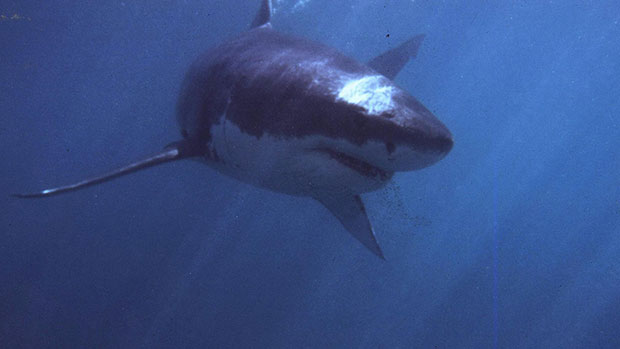Electronic cable tested as a shark barrier in South Africa
An electronic field that repels sharks could be an environmentally friendly alternative to shark nets

A free daily email with the biggest news stories of the day – and the best features from TheWeek.com
You are now subscribed
Your newsletter sign-up was successful
Scientists in South Africa are using an underwater electronic cable to repel sharks in an experiment that aims to protect swimmers and surfers without harming marine animals.
A 100-metre long cable has been placed on the seabed and will emit a low frequency electronic field that has been proven to repel the predators.
Sharks are more sensitive to electric fields than any other animal due to electroreceptors in their noses that help them hunt by detecting muscle contractions in their prey.
The Week
Escape your echo chamber. Get the facts behind the news, plus analysis from multiple perspectives.

Sign up for The Week's Free Newsletters
From our morning news briefing to a weekly Good News Newsletter, get the best of The Week delivered directly to your inbox.
From our morning news briefing to a weekly Good News Newsletter, get the best of The Week delivered directly to your inbox.
"The technology is really specific in that it targets a sense that only sharks and rays have. Mammals like dolphins and whales don't have a sense like this, so they are not going to be affected," Alison Kock, a biological scientist and research manager for Shark Spotters in Cape Town told AFP.
The method is being trialled in the bay of Glencairn beach in Cape Town, where sharks frequently appear during the summer months. Researchers will observe the results for five months, before deciding if the practice should be extended.
"If successful, it will provide the basis to develop a barrier system that can protect bathers without killing or harming sharks or any other marine animals," says the KwaZulu-Natal Sharks Board, the organisation responsible for the project.
The board is also responsible for developing a 'shark pod', which emits a similar electronic field to protect commercial divers.
A free daily email with the biggest news stories of the day – and the best features from TheWeek.com
Scientists say the electronic field will have little impact on humans who come into contact with it as it will only cause a slight "tingling sensation".
Shark nets have been used along the South African coastline for over five decades, but have been criticised for causing the deaths of sharks and other marine animals. The nets have killed 470 sharks every year between 2006 and 2010, according to The Times.
"Everyone is 100 per cent behind this project from the government to environmentalists, because this means we will have fewer sharks ending up dead from being trapped and tangled in the shark nets," Paul Von Blerk, the board's technology specialist told Reuters.
-
 ‘Restaurateurs have become millionaires’
‘Restaurateurs have become millionaires’Instant Opinion Opinion, comment and editorials of the day
-
 Earth is rapidly approaching a ‘hothouse’ trajectory of warming
Earth is rapidly approaching a ‘hothouse’ trajectory of warmingThe explainer It may become impossible to fix
-
 Health insurance: Premiums soar as ACA subsidies end
Health insurance: Premiums soar as ACA subsidies endFeature 1.4 million people have dropped coverage
-
 How cybercriminals are hacking into the heart of the US economy
How cybercriminals are hacking into the heart of the US economySpeed Read Ransomware attacks have become a global epidemic, with more than $18.6bn paid in ransoms in 2020
-
 Language-learning apps speak the right lingo for UK subscribers
Language-learning apps speak the right lingo for UK subscribersSpeed Read Locked-down Brits turn to online lessons as a new hobby and way to upskill
-
 Brexit-hobbled Britain ‘still tech powerhouse of Europe’
Brexit-hobbled Britain ‘still tech powerhouse of Europe’Speed Read New research shows that UK start-ups have won more funding than France and Germany combined over past year
-
 Playing Cupid during Covid: Tinder reveals Britain’s top chat-up lines of the year
Playing Cupid during Covid: Tinder reveals Britain’s top chat-up lines of the yearSpeed Read Prince Harry, Meghan Markle and Dominic Cummings among most talked-about celebs on the dating app
-
 Brits sending one less email a day would cut carbon emissions by 16,000 tonnes
Brits sending one less email a day would cut carbon emissions by 16,000 tonnesSpeed Read UK research suggests unnecessary online chatter increases climate change
-
 Reach for the Moon: Nokia and Nasa to build 4G lunar network
Reach for the Moon: Nokia and Nasa to build 4G lunar networkSpeed Read Deal is part of the US space agency’s plan to establish human settlements on the lunar surface
-
 iPhone 12 launch: what we learned from the Apple ‘Hi, Speed’ event
iPhone 12 launch: what we learned from the Apple ‘Hi, Speed’ eventSpeed Read Tech giant unveils new 5G smartphone line-up
-
 Russian agency behind US election meddling ‘created fake left-wing news site’
Russian agency behind US election meddling ‘created fake left-wing news site’Speed Read Facebook says real reporters were hired by fake editors to write about US corruption